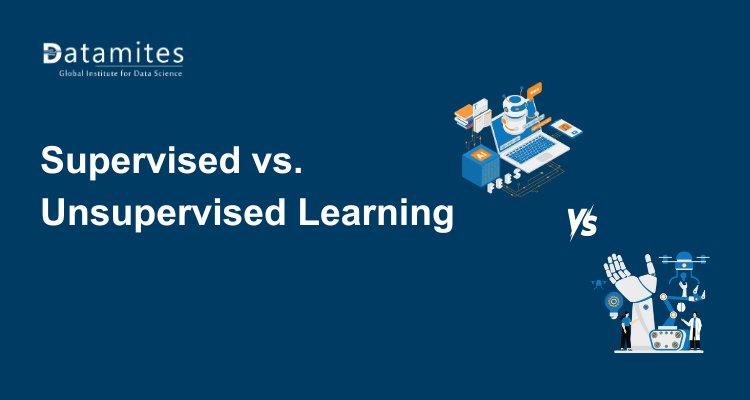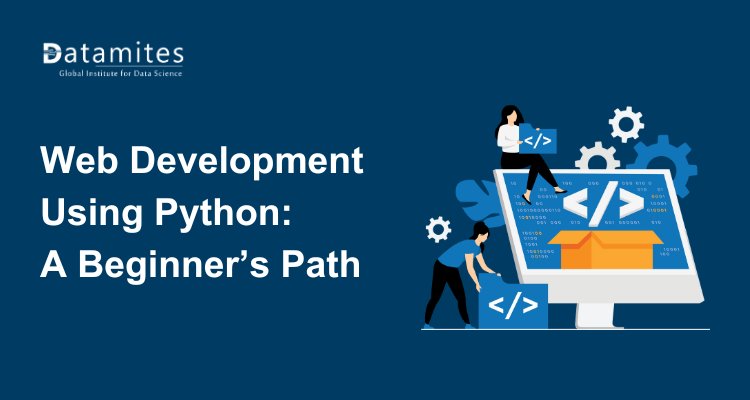Data Analyst Career Scope in Bangalore

Bangalore, frequently known as the “Silicon Valley of India,” stands as a vibrant centre for technology and innovation. In this dynamic city, the career scope for data analysts is particularly promising.
According to a research report from Precedence Research, the global data analytics market reached a valuation of $30 billion in 2022, and it is projected to surpass a staggering $393.35 billion by the year 2032. The industry is anticipated to experience substantial growth, with an estimated annual growth rate of approximately 29.4% from 2023 to 2032.
In this article, we will explore the exciting opportunities and growth prospects that await aspiring data analysts in Bangalore, as well as the skills and industries in high demand in this region.
Unveiling Data Analytics: Meaning and Significance
To find important patterns, trends, and insights, data analysts analyze and evaluate enormous databases. It involves using various statistical, mathematical, and computational techniques to make informed decisions and solve complex problems based on data-driven evidence.
As per the India Brand Equity Foundation, the data analytics sector is expected to generate more than 11 million employment opportunities by the year 2026. Data analytics is widely used in business, science, and various industries to optimize operations, improve decision-making, and gain a competitive edge.
Read these articles:
- Comprehensive Guide to a Career in Data Analytics
- Steps to Start Your Career as a Data Analyst
- Global Analysis of Data Analyst Employment Trends and Salary Insights
Exploring the Role of Data Analysts:
A data analyst is a skilled individual tasked with gathering, processing, and interpreting data to offer valuable insights and aid decision-making processes within an organization. These individuals use a combination of technical skills, statistical knowledge, and domain expertise to uncover patterns, trends, and actionable information from large datasets. Data analysts are crucial in transforming raw data into meaningful knowledge that can guide strategic planning, optimize operations, enhance marketing efforts, and improve overall business performance.
What are the responsibilities of a Data Analyst?
The responsibilities of a data analyst, or in any location, typically include a wide range of tasks related to data collection, analysis, and reporting. However, the specific duties may vary depending on the industry, company, and the level of expertise required. The following are a data analyst’s primary duties:
- Data Collection: Gather and compile data from various sources, including databases, spreadsheets, APIs, and external data providers. Ensure data accuracy and completeness.
- Data Cleaning and Preprocessing: Clean, validate, and preprocess data to remove errors, inconsistencies, and missing values. Convert data into a format suitable for analysis.
- Data Analysis: Utilize statistical and data analysis techniques to identify trends, patterns, correlations, and insights within the data. This may involve using tools like Excel, Python, R, or specialized data analytics software.
- Data Visualization: Create clear and meaningful visual representations of data using charts, graphs, dashboards, and reports to convey insights effectively to stakeholders.
- Hypothesis Testing: Formulate and test hypotheses to answer specific business questions and make data-driven recommendations.
- Predictive Modeling: Develop predictive models using machine learning algorithms to forecast future trends, make recommendations, or solve business problems.
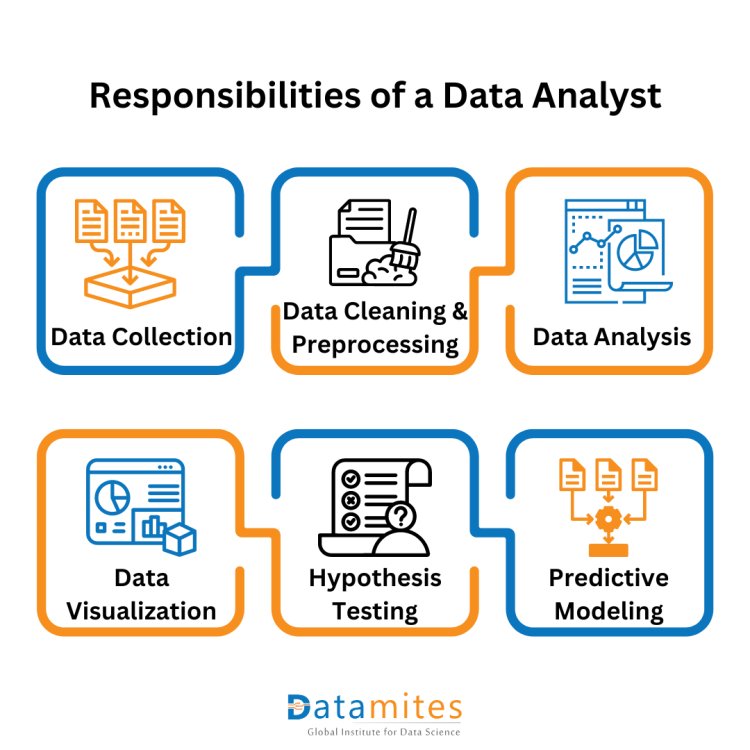
The Significance of Data Analysis in Today’s Business Landscape:
The significance of data analysis in today’s business landscape cannot be overstated. Here are some key reasons why data analysis plays a pivotal role in modern organizations:
Informed Decision-Making: By using facts and evidence instead of hunches or conjecture, data analysis enables firms to make well-informed decisions. By analyzing historical and real-time data, organizations can identify opportunities, assess risks, and formulate strategies with a higher likelihood of success.
Competitive Advantage: In a data-driven world, organisations that effectively harness and leverage their data gain a competitive advantage. Data analysis helps companies understand customer preferences, market trends, and competitive landscapes, enabling them to respond quickly to changing conditions and stay ahead of the competition.
Improved Operational Efficiency: Data analysis enables businesses to make informed decisions grounded in factual evidence rather than relying on intuition or speculation. By optimizing operations through data-driven insights, businesses can reduce costs, improve resource allocation, and enhance overall efficiency.
Enhanced Customer Experience: Understanding customer behaviour through data analysis enables companies to personalize their products and services, tailor marketing campaigns, and provide better customer support. This results in increased customer satisfaction and loyalty.
Risk Management: Data analysis plays a critical role in recognizing and managing risks. Whether it’s financial risks, cybersecurity threats, or compliance issues, data analysts help organizations proactively address potential problems and protect their interests.
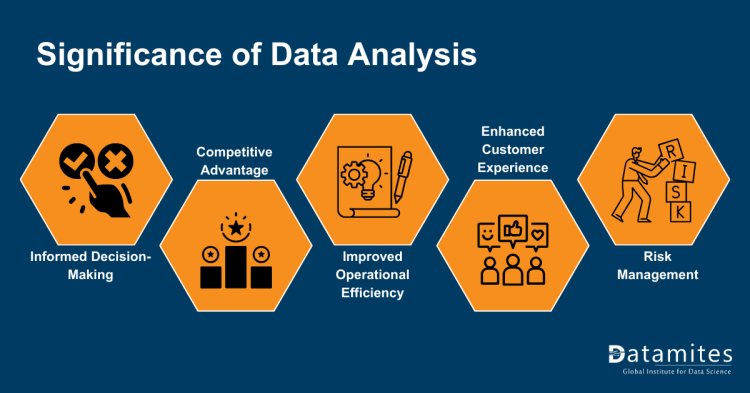
What is the Demand for Data Analysts in Bangalore
The demand for data analysts in Bangalore has been consistently on the rise across various industries, including education, healthcare, finance, telecommunications, and e-commerce. Here’s a breakdown of the demand for data analysts in each of these sectors:
Education:
- Data-Driven Decision-Making: Educational institutions are increasingly relying on data analysis to enhance student outcomes, optimize resource allocation, and improve administrative efficiency.
- Personalised Learning: Taking a Data analyst course in Bangalore is essential for developing personalized learning experiences by analyzing student performance data and tailoring teaching methods accordingly.
Healthcare:
- Patient Care and Management: Data analysts play a critical role in healthcare by analyzing patient data, predicting disease outbreaks, optimizing treatment plans, and improving hospital operations.
- Medical Research: In medical research, data analysts assist in analyzing large datasets to identify trends, discover potential treatments, and contribute to breakthroughs in healthcare.
Finance:
- Risk Assessment: In the financial sector, data analysts are instrumental in assessing and mitigating risks, detecting fraud, and optimizing investment strategies.
- Customer Insights: Financial institutions use data analysis to understand customer behaviour, and preferences, and improve the delivery of financial services.
Telecommunications:
- Network Optimization: Data analysts help telecommunications companies optimize network performance, predict network failures, and enhance the quality of service.
- Customer Experience: Analyzing customer data aids in improving the customer experience, identifying areas of improvement, and reducing churn rates.
E-commerce:
- Customer Analytics: E-commerce companies heavily rely on data analysis for understanding customer behaviour, optimizing product recommendations, and enhancing the online shopping experience.
- Inventory Management: Data analysts in e-commerce work on inventory optimization, demand forecasting, and supply chain management.
Refer these articles:
- Average Salary for Data Analysts in India
- Salary Insights for Artificial Intelligence Engineers in India
- Factors Influencing Data Scientist Salaries in India
What is the career scope of data analytics in Bangalore?
The career scope of data analytics in Bangalore, often referred to as the Silicon Valley of India, is quite promising due to several factors:
IT and Tech Hub: Bangalore is a major IT and technology hub in India, hosting many national and international tech companies. This environment creates a high demand for data analytics professionals to analyze and interpret complex data sets for business decisions.
Start-up Culture: The city is known for its vibrant start-up culture. Many of these start-ups are in sectors like e-commerce, fintech, and health tech, where data analytics plays a crucial role.
Diverse Industries: Apart from IT and startups, Bangalore has a diverse range of industries including biotechnology, manufacturing, and education, all of which increasingly rely on data analytics for operational and strategic decisions.
Education and Training Opportunities: The presence of numerous educational and training institutes offering specialized courses in data analytics and related fields helps in continuously supplying skilled professionals to the industry.
Salary and Growth Prospects: The demand for data analytics professionals often results in competitive salaries. Additionally, there is a significant opportunity for career growth, given the evolving nature of the field and the continual need for these skills.
Global Exposure: Many global companies have their offices in Bangalore, offering opportunities to work on international projects and gain global exposure.
Digital Transformation Initiatives: With digital transformation being a priority for many businesses, data analytics is becoming increasingly important for making informed decisions and staying competitive.
What are the Qualifications and Key Skills to become a data analyst in Bangalore?
To become a data analyst in Bangalore, certain qualifications and key skills are typically required:
Educational Background:
- Bachelor’s Degree: Common fields of study include statistics, mathematics, computer science, economics, information management, or finance.
- Advanced Degrees: Though not always necessary, a master’s degree in data analytics, data science, or a related field can be beneficial.
Technical Skills:
- Data Analysis Tools: Proficiency in tools like Excel, SQL, R, and Python is often essential.
- Database Management: Understanding of database technologies such as MySQL, PostgreSQL, or MongoDB.
- Data Visualization: Skills in data visualization tools like Tableau, PowerBI, or D3.js.
- Statistical Analysis: Knowledge of statistical theories and methods to analyze data effectively.
Analytical Skills:
- Critical Thinking: Ability to critically analyze data and extract meaningful insights.
- Problem-Solving: Skills in identifying issues and providing data-driven solutions.
Soft Skills:
- Communication: Effective verbal and written communication skills to convey data insights to non-technical stakeholders.
- Attention to Detail: Precision in data analysis to ensure accuracy of findings.
- Organization and Time Management: Ability to manage multiple projects and meet deadlines.
Certifications:
While not always required, certifications can enhance your credentials and demonstrate proficiency in specific tools or technologies. Some relevant data analyst certifications in Bangalore include:
- IBM Data Analyst Professional Certificate
- NASSCOM Certified Data Analytics Professional
- IABAC Certified Data Analyst
- Google Data Analytics Professional Certificate
- Microsoft Certified: Data Analyst Associate
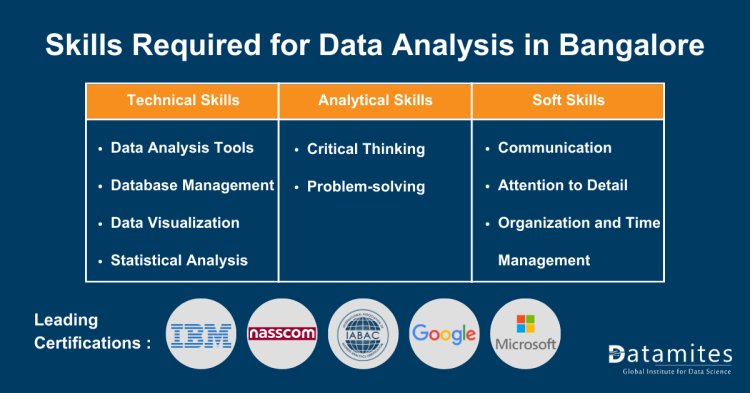
Refer these articles:
- Exploring the Data Science Career Landscape in Bangalore
- Data Science Career Opportunities in Chennai
- Exploring Data Science Opportunities in Pune
What are the Salary Trends and Compensation of a data analyst in Bangalore?
Data analysis is a robust career in Bangalore and here is the overview of salary trends, and factors that influence the salary.
A. Average Salary Ranges for Data Analysts in Bangalore:
The salary range for data analysts in Bangalore can vary based on factors such as experience, education, skills, and the industry in which they work. However, here’s a rough estimate of average salary ranges for data analysts in Bangalore:
- The salary of an Entry-level Data Analyst in Bangalore ranges from INR 502377 per year according to an Indeed report.
- The salary of a Senior Data Analyst in Bangalore ranges from INR 16,95,997 per year according to a Glassdoor report.
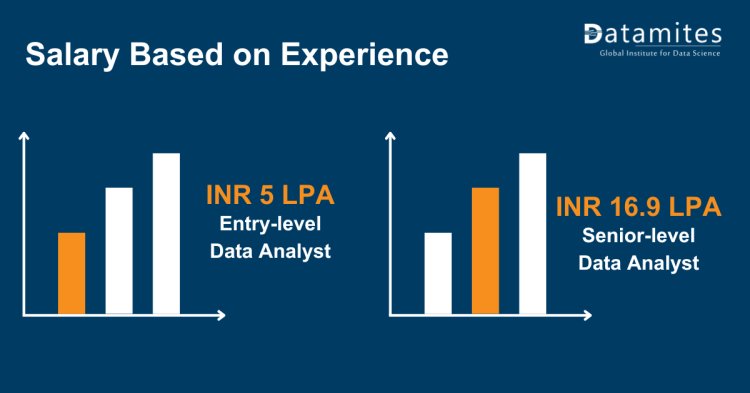
B. Factors Influencing Salary Variations:
- Experience: Data analysts with more years of experience typically command higher salaries.
- Skills: Specialized skills such as data visualization, machine learning, big data analysis, and proficiency in specific programming languages like Python or R can lead to higher pay.
- Industry: Your salary can be notably influenced by the industry in which you are employed. Data analysts in finance, healthcare, and e-commerce sectors may earn more than those in other industries.
- Education: A master’s degree or advanced certifications in data analytics, data science, or related fields can result in better compensation.
- Location: Salaries can vary between cities, with Bangalore being one of India’s leading technology hubs, offering competitive salaries.
- Negotiation Skills: Your ability to negotiate your compensation package can also influence your salary.
Wrap-up:
The data analyst career in Bangalore presents a promising and dynamic opportunity due to the city’s status as a major tech hub. The demand for skilled data analysts is continually growing, driven by the expansion of the IT and business sectors. This career path offers a blend of challenging and rewarding experiences, making it a viable and potentially lucrative choice for professionals in the field.
DataMites, a renowned institution, stands at the forefront of providing excellent data analytics training in Bangalore. With multiple conveniently located centres in Kudlu Gate, BTM and Marathalli, they offer comprehensive programs meticulously crafted to empower aspiring data scientists with the necessary skills and expertise for success in the field. These courses also come with prestigious certifications from IABAC and NASSCOM FutureSkills, ensuring that students receive the highest quality data analytics education in Bangalore. For individuals seeking classroom-based data analytics courses in Bangalore, DataMites is a reliable and conveniently accessible choice to kickstart a fulfilling career in this thriving industry.




